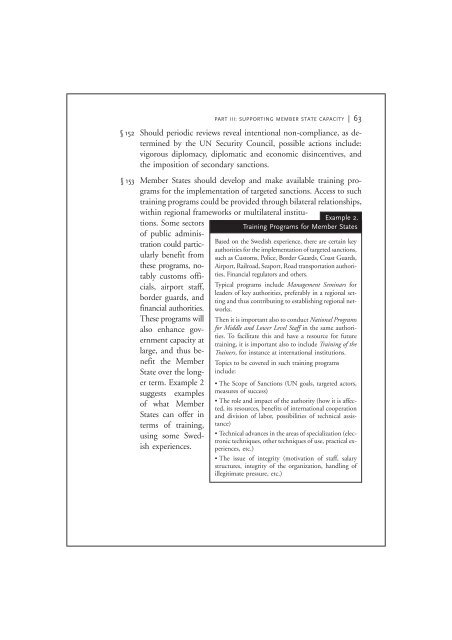Making Targeted Sanctions Effective - Small Arms Survey
Making Targeted Sanctions Effective - Small Arms Survey
Making Targeted Sanctions Effective - Small Arms Survey
Create successful ePaper yourself
Turn your PDF publications into a flip-book with our unique Google optimized e-Paper software.
§ 152<br />
§ 153<br />
PART III: SUPPORTING MEMBER STATE CAPACITY | 63<br />
Should periodic reviews reveal intentional non-compliance, as determined<br />
by the UN Security Council, possible actions include:<br />
vigorous diplomacy, diplomatic and economic disincentives, and<br />
the imposition of secondary sanctions.<br />
Member States should develop and make available training programs<br />
for the implementation of targeted sanctions. Access to such<br />
training programs could be provided through bilateral relationships,<br />
within regional frameworks or multilateral institutions.<br />
Some sectors<br />
of public administration<br />
could particularly<br />
benefit from<br />
these programs, notably<br />
customs officials,<br />
airport staff,<br />
border guards, and<br />
financial authorities.<br />
These programs will<br />
also enhance government<br />
capacity at<br />
large, and thus benefit<br />
the Member<br />
State over the longer<br />
term. Example 2<br />
suggests examples<br />
of what Member<br />
States can offer in<br />
terms of training,<br />
using some Swedish<br />
experiences.<br />
Example 2.<br />
Training Programs for Member States<br />
Based on the Swedish experience, there are certain key<br />
authorities for the implementation of targeted sanctions,<br />
such as Customs, Police, Border Guards, Coast Guards,<br />
Airport, Railroad, Seaport, Road transportation authorities,<br />
Financial regulators and others.<br />
Typical programs include Management Seminars for<br />
leaders of key authorities, preferably in a regional setting<br />
and thus contributing to establishing regional networks.<br />
Then it is important also to conduct National Programs<br />
for Middle and Lower Level Staff in the same authorities.<br />
To facilitate this and have a resource for future<br />
training, it is important also to include Training of the<br />
Trainers, for instance at international institutions.<br />
Topics to be covered in such training programs<br />
include:<br />
• The Scope of <strong>Sanctions</strong> (UN goals, targeted actors,<br />
measures of success)<br />
• The role and impact of the authority (how it is affected,<br />
its resources, benefits of international cooperation<br />
and division of labor, possibilities of technical assistance)<br />
• Technical advances in the areas of specialization (electronic<br />
techniques, other techniques of use, practical experiences,<br />
etc.)<br />
• The issue of integrity (motivation of staff, salary<br />
structures, integrity of the organization, handling of<br />
illegitimate pressure, etc.)
















